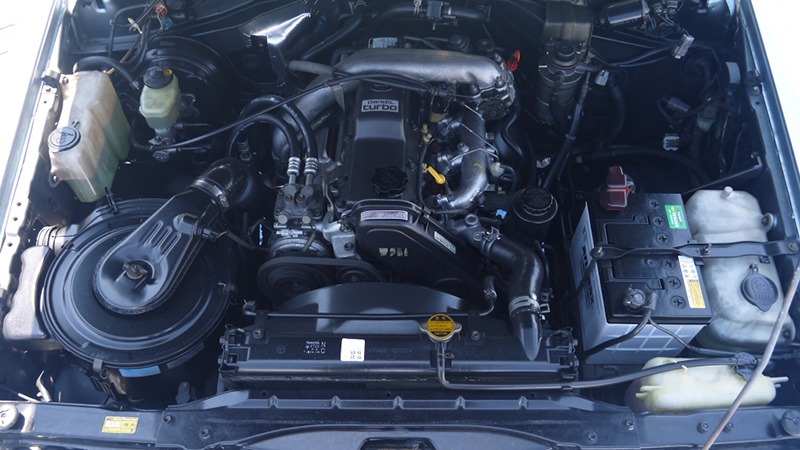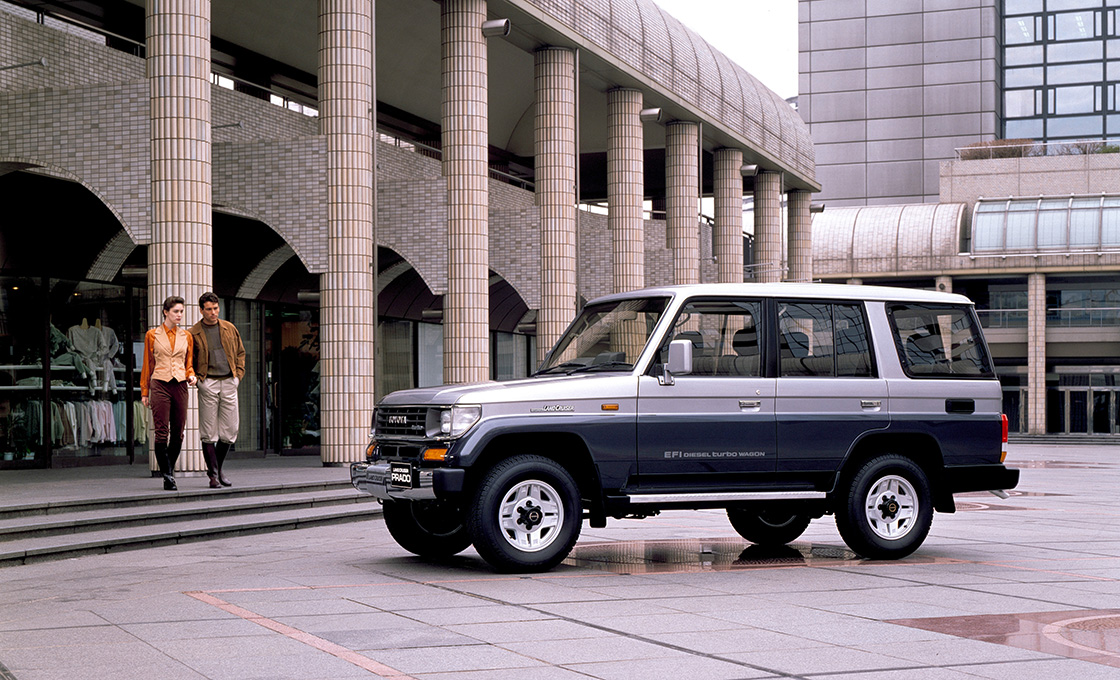What is the Land Cruiser 70 Prado?
The 70 Prado is back in popularity
The Land Cruiser 70 Prado is a light Land Cruiser based on the heavy-duty Land Cruiser 70 Van, but developed for a wide range of the general public. While the 70 Van is registered as a commercial vehicle, the 70 Prado is registered as a passenger vehicle and is positioned closer to the general public in terms of size and economy. Although it made its debut in April 1990, it was marketed as a Land Cruiser 70 wagon (2-door short only) from November 1984 before it received the Prado name.
In November 1984, the Land Cruiser 40 (Yonmaru) underwent a full model change to the Land Cruiser 70 Van. The Land Cruiser 70 series debuted as a double feature of heavy duty and light duty, which is the basis for the Land Cruiser 70 Prado. The Land Cruiser 70 Prado comes in two styles, a 2-door, and a 4-door, and is based on the body and chassis of the Land Cruiser 70 Van, but uses coil springs instead of leaf springs for suspension. It received the same setup as the Hilux Surf with its 4-cylinder engine, as well as powertrain and axles. In April 1996, The Land Cruiser 70 Prado ended production after six years and was redesigned into the Land Cruiser 90 Prado in May of the following year.
During its production years, the Land Cruiser 70 Prado had a hard time competing with the Mitsubishi Pajero (Montero in the United States), but thanks to Land Cruiser’s durable reputation, there are still many vehicles in the used car market. In recent years, the popularity of the Land Cruiser 70 Prado is being renewed in a retro boom.
Land Cruiser 70 Prado Body size and design comparison with past major models
| Model | Land Cruiser 70 Wagon | Land Cruiser 70 Prado | Land Cruiser 90 Prado |
|---|---|---|---|
| Sale Period | 11/1984 -3/1990 | 4/1990 – 4/1996 | 5/1996 – 9/2002 |
| Length | 156 inches | 184 inches | 193 inches |
| Width | 67 inches | 74 inches | 74 inches |
| Height | 73 inches | 74 inches | 73 inches |
| Minimum Turning Radius | 208 inches | 240 inches | 224 inches |
| Vehicle Weight | 3,703 pounds | 4,188 – 4,299 pounds | 4,012 – 4,277 pounds |
| Boarding Capacity | 5 people | 8 people | 8 people |
| Engine Type | Gasoline: No setting Diesel: 2.5L (Straight 4 turbo: 2L-T) | Gasoline: No setting Diesel: 2.5L (straight 4 turbo: 2L-T) / 3.0L (straight 4 turbo: 1KZ-TE) | Gasoline: 2.7L (straight 4: 3RZ-FE) / 3.4L (V6: 5VZ-FE) Diesel: 3.0L (straight 4 turbo: 1KZ-TE) / 3.0L (straight 4 turbo: 1KD-FTV) |
| 4WD System | Part-Time | Part-Time | Full-Time |
| New Car Price | $15,000-$15,900 | $18,000-$23,000 | $20,600-$25,300 |
*The 70 wagon has 2 doors; the 70 Prado and the 90 Prado have 4 doors
*Body size is a typical final model (excluding optional equipment, etc.)
*Vehicle weight does not include optional equipment
*The price when new is the manufacturer’s suggested retail price (tax included) of the final model.
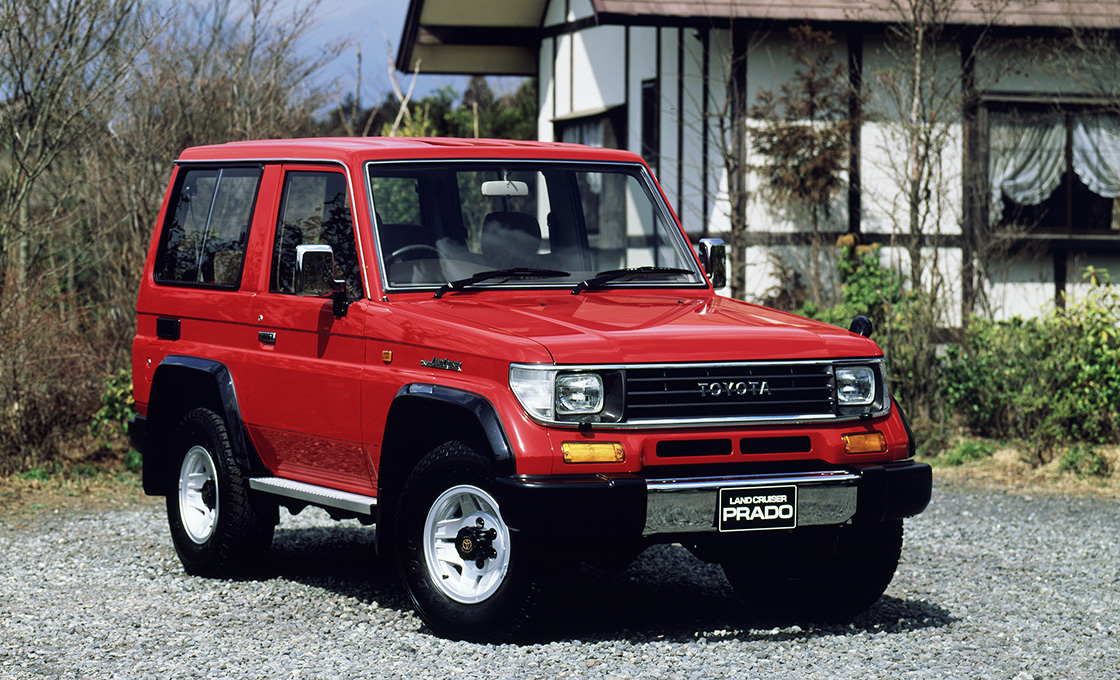
The 70 Prado has a square body and good interior comfort
The Land Cruiser 70 Prado comes in two body styles: a 2-door and a 4-door (Toyota calls it a 3-door and a 5-door). The cabin part is almost the same as the Land Cruiser 70 Van, and unlike the Land Cruiser 70 Van, which has an independent fender from the base of the front door to the front end, the 70 Pardo has a soft shape with little unevenness. In addition, the nose is short and sporty because it is unlikely that a front winch or other towing equipment will be added to the front bumper. The headlamps have two square lenses instead of the two round ones of the Land Cruiser 70 Van, and thanks to the horizontally long design grille and body panel embedded turn signals, its face appears much softer.
The ladder-type frame, which is the base of the body, is lighter weight, and the front and rear suspensions are rigid axles with coil springs for more comfort. However, due to this structure, the steering angle is limited, and the maneuverability is almost the same as the Land Cruiser 70 Van. The square body makes it easy to cut corners, which compensates for the small steering angle.
The square body of the 70 Prado offers more interior space. Excluding the overfenders, the body size fits in a 4-number small car category, but the interior width is one classification higher. Moreover, the angled windshield makes the cabin feel spacious for passengers in both the front and the rear, which makes it feel like a family car. In the interior, the instrument panel was specially designed. The instrument panel of the Land Cruiser 70 Van is simple with straight lines and a more industrial look to it, but the 70 Prado instrument panel is casual and has a softer appearance. The successor to the Land Cruiser 70 Prado is the Land Cruiser 90 Prado, which has no commonality with the 70 Prado due to its completely new design. The retro feel and ruggedness of the 70 Van are gone, and the design and driving are definitively passenger-car-oriented.
Land Cruiser 70 Prado changes in specifications and equipment
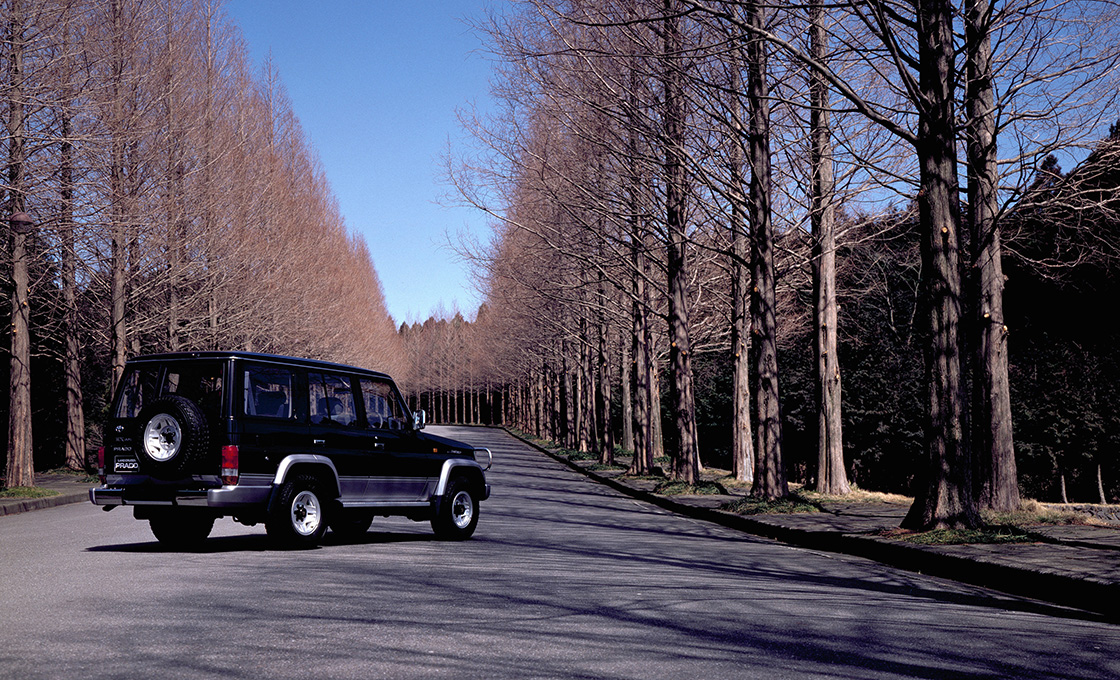
April 1990
The Land Cruiser 70 Prado succeeded the Land Cruiser 70 Wagon. The 70 Wagon was only available as a 2-door short body, but the 70 Prado also has an 8-seater 4-door long in addition to the 5-seater 2-door short. The models are LX5, SX5, and EX5 with narrow bodies only.
August 1991
The “5” was omitted from the model name. A wide specification EX wide equipped with overfenders and wide tires was added to the highest grade 4-door EX.
May 1992
The highest model EX wide Limited is fully-equipped.
August 1992
The SX wide, which is a wide body, is new for the SX model 4-seater.
May 1993
The 2.4-liter in-line 4 diesel turbo engine, which was continued from the 70 Wagon, was changed to a newly developed 3.0-liter in-line 4 diesel turbo engine. In response to the 1992 diesel emissions regulations, it has become more powerful and cleaner. In the model lineup, a 5-door SX wide was added to the 2-door SX.
May 1994
A special memorial package is added to the 4-door SX wide to commemorate the achievement of the production of 2.5 million Land Cruiser models.
January 1995
The body color was added and trims such as seats were revised.
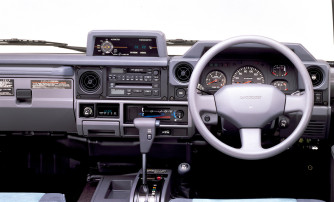
Two types of 70 Prado: 2-door (71 Prado) and 4-door (78 Prado)
Land Cruiser 70 Prado was in production for 6 years, which is somewhat short-lived for a Land Cruiser. The biggest turning point during that time would be that the diesel engine was changed to the latest version in May 1993. In addition, Toyota increased the wide body specification as if responding to market demand, and added convenient functions and 4WD-related functional improvements.
The Land Cruiser 70 Prado styles include 2-door and 4-door, each with a narrow style without overfenders and a wide style with overfenders. Land Cruisers are often called by model numbers such as Rokumaru (Land Cruiser 60) and Hachimaru (Land Cruiser 80), but in the case of the 70 Prado, the two-door car is 71 (Nanaichi) and the 4-door car is 78 (Nanahachi) among Land Cruiser enthusiasts.
There are three models, the LX5, SX5, and EX5 in order from the bottom when it debuted, and from August 1991, they were renamed to LX, SX, and EX, and an EX wide with overfenders was added to the EX model. In addition, in August 1992, the SX wide was added to meet the growing popularity of wide bodies.
As for the transmission, the LX is only available with a 5-speed MT, while the SX (wide) and EX (wide) offer a 5-speed MT or a 4-speed AT. The difference between each trim level is mainly the difference in interior features that include seats, high-tech equipment, and optional equipment like differential locks, as well as the difference in tires and wheels.
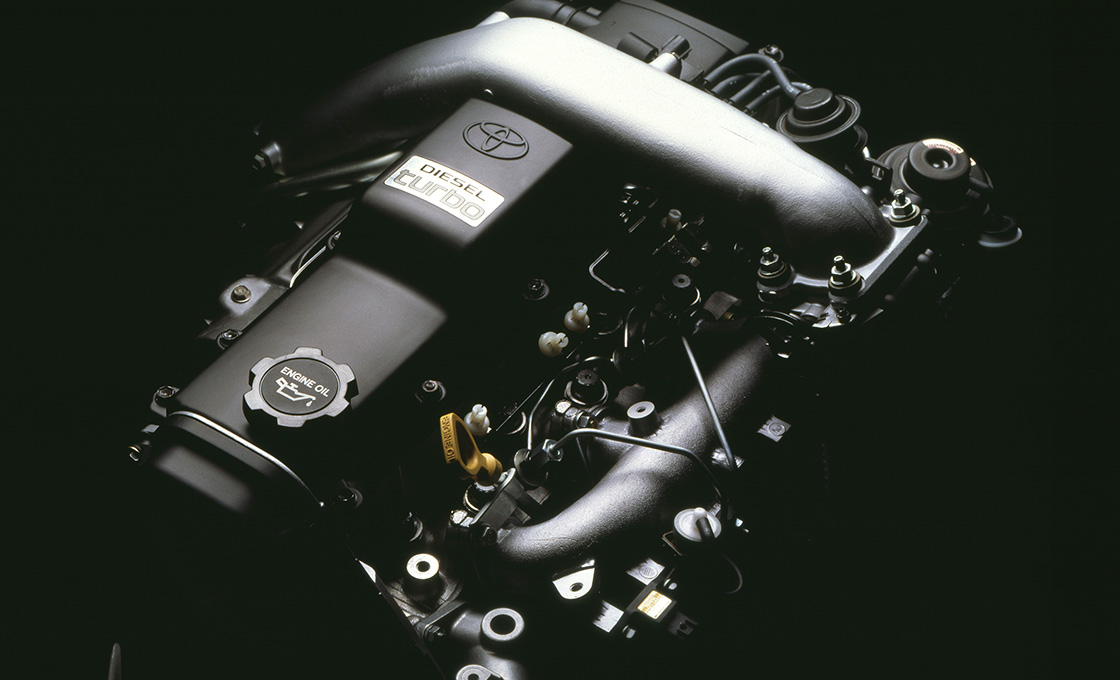
Land Cruiser 70 Prado engine type
The engine installed in the Land Cruiser 70 Prado is only an in-line 4-cylinder diesel turbo engine throughout its production. After the minor change in May 1995, it was divided into the early model and the late model. The 2L-TE is an improved version of the 2L-T that was installed in the Land Cruiser 70 Wagon before renaming it “Prado”, incorporating an electronic control system in the fuel injection to meet emissions regulations.
The 1KZ-TE was Toyota’s state-of-the-art 4-cylinder diesel engine at that time, and by increasing the displacement while developing electronic control, it aimed at cleaner exhaust gas and increased power simultaneously. The 2L-TE has a maximum output of 97PS/95HP@3800rpm and a maximum torque of 24.5kgm/177 lb.-ft.@2400rpm. The 1KZ-TE has 130PS/128HP@3600rpm and 29.5kgm/213 lb.-ft.@2000rpm, and there is a big difference in performance between the early and late models, both on-road and off-road.
The reason the late model had such a power boost was that at the time there was a growing demand in the market for an economical and powerful compact diesel engine. In addition to the Land Cruiser 70 Prado, the 1KZ-TE was a powerful diesel engine that was later installed in the Hilux Surf (130 series, 185 series, and 215 series), Land Cruiser 90 Prado, Hiace, and Granvia. When choosing a used car, it is a good idea to look for a late model with the 1KZ-TE.
Land Cruiser 70 Prado Test Drive Impressions & Report
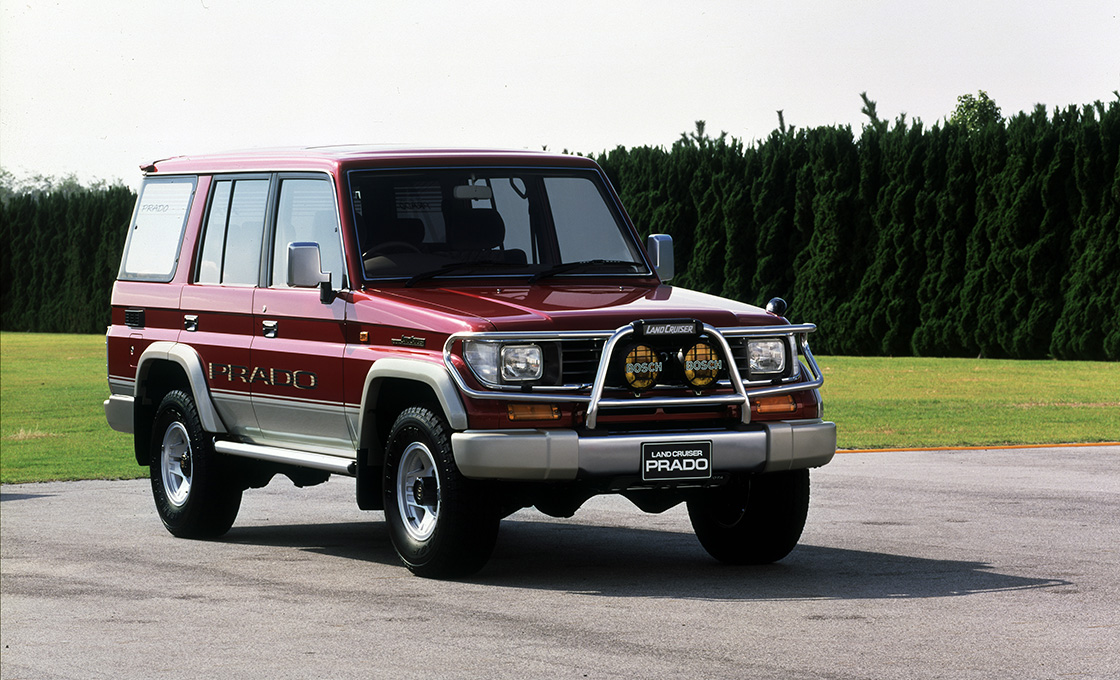
2.4L that can be swapped with two doors, 3.0L that is reliable even when fully loaded
There is quite a bit of difference between the early and late engines when it comes to performance. The difference in power is obvious, and everyone should prefer the late 3.0-liter model. The diesel engine of the previous model generates a torque commensurate with the displacement, but even if the RPMs are increased, there is not much of a difference in driving excitement. However, even with a 2.4-liter engine, a 2-door short with a lighter body can move quickly through city streets. On the highway, if you step on the accelerator give yourself room when overtaking other vehicles and accelerating.
On the other hand, the 3.0-liter engine installed in the late model does not have many weak points. There are more powerful diesel engines out there now, but this 3.0-liter diesel engine is still as strong as it is now, apart from its exhaust emissions performance. The 2-door car offers the illusion of a powerful gasoline engine, and the 4-door car makes highway driving stress free.
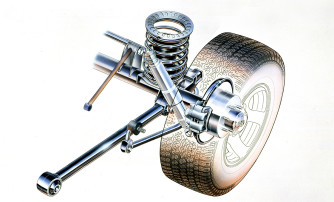
Watch out for gaps when driving off-road
The Land Cruiser 70 Prado inherited the Land Cruiser 70 Van’s durability in both its frame and body. However, the suspension is a coil spring, which is different from the Land Cruiser 70 Van. In terms of ride comfort and handling stability, it can surpass the leaf spring Land Cruiser 70 Van, but if you drive off-road, you may need some help. In general, while cross-country driving on rough terrain, the amount of suspension stroke can make the difference. The suspension of the Land Cruiser 70 Prado has a short stroke because the arms that support the axle are made short. On terrain with large gaps between obstacles, the tires float and slip easily. But suspension travel isn’t all about off-road performance. If you can handle the part-time 4WD well, it is not impossible to overcome the gap while floating the tires. In fact, the Land Cruiser 70 Prado may not be for 4WD beginners but could be for seasoned off-road enthusiasts.
Land Cruiser 70 Prado Tips for choosing a used car
There is also a choice of a narrow body rather than a wide body
The Land Cruiser 70 Prado was not a popular car in Japan, so there weren’t many new car sales, and it’s been 20 years since the end of production, so there weren’t many in the used car market. However, in recent years, it seems that users who have been holding onto their vehicles have started to trade them in, and the number of vehicles in the market is increasing. Along with that, new fans that are drawn to the retro feel of the square body are increasing.
Most of the Land Cruiser 70 Prados on the used car market are customized, and the commonality seems to be an off-road style with a slightly lifted tire size. Many of these models are based on wide specs with overfenders, but if you are a retro fan, you may want to choose a narrow body with a smooth body. It seems that not only the narrow spec model but also the wide spec retro customization with the overfender removed is popular.
The market price of used cars is between $3,600 and $15,000 for the previous model. Late models cost about $5,120 to $18,300. By model, the SX wide is the center of the lineup. As with other Land Cruisers, there are many customized used cars, so depending on the details of the customization, the price may be higher than the above. We recommend that you carefully check the equipment and custom status before purchasing.
Enjoy the appeal that modern cars do not have

The appeal of the Land Cruiser 70 Prado is abundant. The best is the late model with the 3.0-liter diesel turbo installed. The second is a highly stable suspension with a reputation for on-road performance rather than off-road. Thirdly, it is highly economical due to passenger car registration classification and a diesel engine. Fourth, the room is spacious and comfortable. And finally, it is rarely seen in the city. When it was being sold as a new car, Toyota was forcibly advertising the concept of “metropolitan” rather than appealing to such charm. As a result, there was a gap between Toyota’s concept and the image of 70 Prado’s wild body succeeded from the Land Cruiser 70 Va, and the reactions from the market stayed lukewarm.
However, the time has passed, and even though the Land Cruiser 70 Prado has a shaky reputation as being a tough vehicle, it offers a comfortable drive, and more and more fans are paying attention to it. I don’t like the words cross-country or off-road, but if you like the comfortable roominess and a retro atmosphere that modern cars don’t have, the Land Cruiser 70 Prado may be a good buy.



